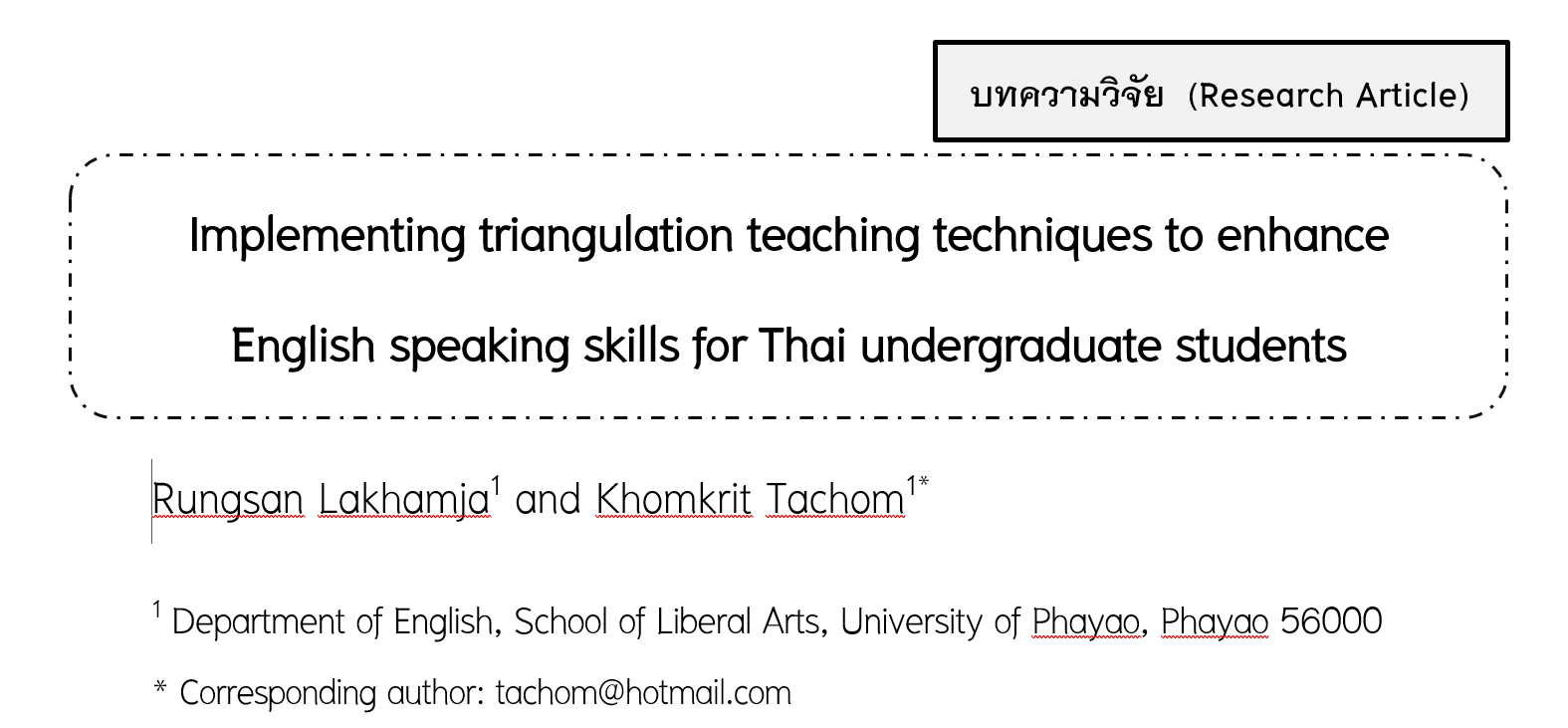Implementing Triangulation Teaching Techniques to Enhance English Speaking Skills for Thai Undergraduate Students
Keywords:
Triangulation teaching techniques, Chiang Kham District, Task-based language teaching, Learning motivation, English speaking skillsAbstract
This article reports the findings of implementing triangulation teaching techniques, consisting of collaborative learning, task-based language teaching, and learning motivation for Thai undergraduate students. The study aimed to investigate the effectiveness of Triangulation Teaching Techniques for improving English speaking skills for Thai undergraduate students enrolling in English for Business Communication and also a survey of students’ satisfaction towards Triangulation Teaching Techniques. A sample group for data collection was a class of 42 fourth-year undergraduate students enrolled during English for Business Communication, which has a different language proficiency. The instruments were pretest and posttest, speaking role-play tasks, students’ satisfaction questionnaire, students’ reflective journal, and student case study. Quantitative data were statistically analyzed by mean scores, standard deviation, and t-test. Meanwhile, content analysis was applied for qualitative one. The results indicated that the implementation of triangulation teaching techniques facilitated the enhancement of English speaking skills through speaking role-play tasks, which were meaningful and enhanced students' communicative competence and interaction. It can be concluded that triangulation teaching techniques are a good approach used in the promotion of English speaking skills.
References
Bancha, W. (2010). Problems in teaching and learning English at the faculty of international studies, Prince of Songkla University, Phuket. Retrieved July 3, 2016, from https://fis.psu.ac.th/jis_file/res_project/2010_woralak.pdf.
Barlow, D. (2013). Design of an English speaking skills development course for second language learners. (Doctoral Dissertation, Ph.D). Chonburi: Burapha University.
Bilash, O. (2009). Triangulation. Retrieved July 18, 2017, from https://sites.educ.ualberta.ca/staff/olenka.bilash/Best%20of%20Bilash/Triangulation.html.
Burnett. S. (2009). Development during adolescence of the neural processing of social emotion. Journal of Cognitive Neuroscience, 21(9), 1736-1750. from doi: 10.1162/jocn.2009.2112.
Chawna, K. (2010). The behaviors conductive to building English learning motivation of model English teachers under the supervision of the office of the basic education commission. (Master Thesis of Education). Bangkok: Ramkhamhaeng University.
Dörnyei, Z. (2001). Motivational strategies in the language classroom. Cambridge: CUP.
Han-Yu, S. & Gwo-Jen, H. (2013). A collaborative game-based learning approach to improving students' learning performance in science courses. Computers & Education, 63(4), 43-51. Retrieved May 21, 2017, from https://doi.org/10.1016/j.compedu.2012.11.019.
Heaton, J. B. (1988). Writing English language tests (new edition). London: Longman.
Jarvela S. & Jarvenoja, H. (2011). Socially Constructed Self-Regulated Learning and Motivation Regulation in Collaborative Learning Groups. Teachers college record, 113(2), 350-374.
Mejang, A. (2008). Integrating project-based learning in an English for academic purposes course: a case study of Thai medical Students. Suranaree Journal of Science and Technology, 2(2), 1-18.
Nonkukhetkhong, K., B. Baldauf Jr, R. & Moni, K. (2006). Learner centeredness in teaching English as a foreign language: Teachers' Voices.
Pilot, D. F., & Hungler, B. P. (1999). Nursing research: principles and methods. Philadelphia: JB Lippincott Company.
Poodla, R. (2010). The development of English speaking skills of the fourth year students at Rajabhat Maha Sarakham University through role-play. (Master thesis of Arts). Maha Sarakham: Rajabhat Maha Sarakham University.
Ratanapinyowong, P. Poopon, K. & Honsa, Jr.S. (2007). Problems and solutions in teaching and assessing English skills in Thai higher education and the need for professional development. Voices of Asia 2007 Symposium, MARA University of Technology (UiTM), Malaysia.
Richards, J. C., & Rodgers, T. S. (2001). Approaches and methods in language teaching. Cambridge, UK: Cambridge University Press, From http://dx.doi.org/10.1017/CBO9780511667305.
Somdee, M., & Suppasetseree, S. (2013). Developing English speaking skills of Thai undergraduate students by digital storytelling through websites. In 3rd International Conference Proceedings by LITU (No. 2). from http://www.litu.tu.ac.th/journal/FLLTCP/Proceeding/166.pdf.
Tachom, K. (2014). Researching innovation in task-based teaching: Authentic use of professional English by Thai nursing students. (Doctor of Philosophy). UK: The University of Southampton.
Wiriyachitra, A. (2003). Thai teachers’ role in teaching: Motivating students and guiding their learning. Thai TESOL Focus, 16(2), 25-27.

Downloads
Published
How to Cite
Issue
Section
License
Copyright (c) 2021 Phayao University

This work is licensed under a Creative Commons Attribution-NonCommercial-NoDerivatives 4.0 International License.
ผู้นิพนธ์ต้องรับผิดชอบข้อความในบทนิพนธ์ของตน มหาวิทยาลัยพะเยาไม่จำเป็นต้องเห็นด้วยกับบทความที่ตีพิมพ์เสมอไป ผู้สนใจสามารถคัดลอก และนำไปใช้ได้ แต่จะต้องขออนุมัติเจ้าของ และได้รับการอนุมัติเป็นลายลักษณ์อักษรก่อน พร้อมกับมีการอ้างอิงและกล่าวคำขอบคุณให้ถูกต้องด้วย
The authors are themselves responsible for their contents. Signed articles may not always reflect the opinion of University of Phayao. The articles can be reproduced and reprinted, provided that permission is given by the authors and acknowledgement must be given.







